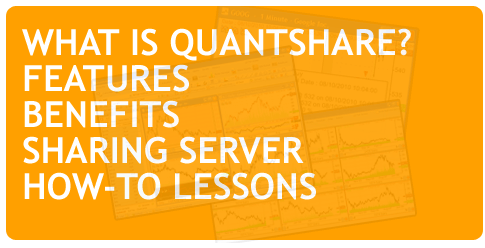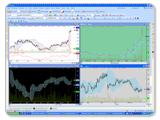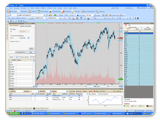The sharing server already contains more than 65 list of symbols, including symbols for U.S. and Major Stock Exchanges, Major world indices, ETF, Forex, Options and Futures Markets. To add symbols of a specific market to your account, you simply need to download the corresponding trading item from the website then double click on it to open a small form in QuantShare Trading Software. In this form, you can choose to add the ticker symbols to the current account or to a new one. Make your choice and you are done. If you have your own list of ticker symbols or have downloaded a list from the web, you can add this list in QuantShare very easily. In the next paragraph, we will show you how to do that. How to add a list of ticker symbols Your symbols may contain the ticker name, descriptive name, currency, sector, market, index... You can use a spreadsheet such as excel to create and manipulate this list and when you are ready to insert the data into QuantShare, simply export the list in CSV format (Each line represents a symbol and symbol's information is separated by a unique character such as a comma or a semi-colon). In QuantShare, select "Symbol" then "Create a list of symbols from a file". Type the separator character (Depending on the format of your CSV file - Usually the separator is a semi-colon) then Click on "Load file" and select your ticker symbols list. The grid may contain one or several columns where each column displays information about a specific symbol. If your data looks like "A;Agilent Technologies;NYSE;Electronic", then the first column contains the ticker name, the second one the company title, the third one the company's market and the last one the company's industry. You will notice that the first line is empty and of a different color. This is because this line determines the type of the column. Remember our last example: The first column is the ticker name, so simply double click on the first cell of the first row and select "Name". In the second cell, select "fullname", then "market" and finally in the last cell select "industry". The next step would be to click on the "Create List" button and then confirm that you want to create the list. You will be invited to enter the list name and save it. Now select "Symbol" then "Add-Remove from a list of symbols". Click on "Select List" to select the previously created list, and then click on "Add" to add the ticker symbols, with the additional information, to your database. Notice the "Remove" button; this allows you to delete symbols that exist in a list of ticker symbols from an existing database. How to share the ticker symbols list Your list of symbols is also ready to be shared. You simply need to select "Tools" then "Sharing Server", select your item then click on the "Share Selected Item" button. By the way, here is a very nice web page where you can get ticker symbols for all markets in the world and for different asset types (Commodity, Currency, Equity, Indices, ETFs, Mutual Funds, Bonds, Options, Futures...).
|

|
|
|
|







